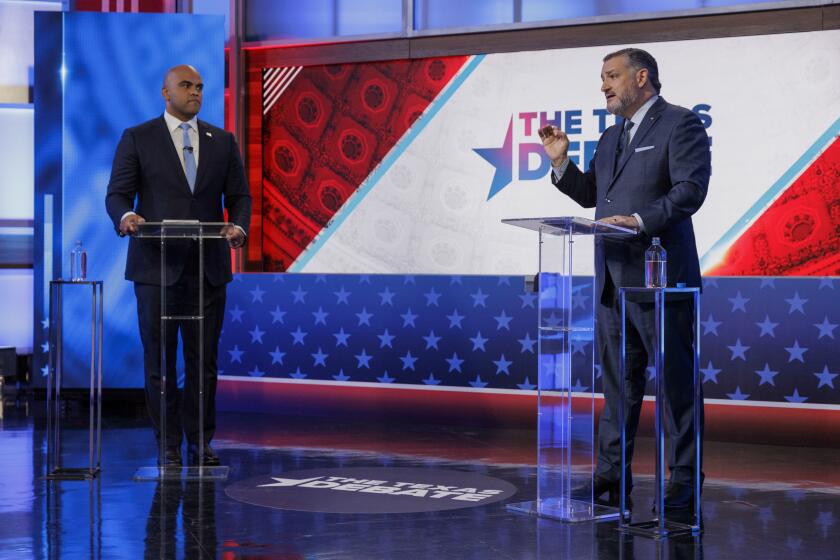Liberia’s Doe Deserves No More U.S. Aid
Today Liberia is playing host to a team of auditors from the congressional General Accounting Office sent there to determine the amount of U.S. aid money that may have been diverted for the Liberian president’s personal use. Until their report is submitted to Congress, there must be an immediate cut-off of aid.
Gen. Samuel K. Doe, who seized office six years ago, was overwhelmingly rejected by more than 75% of the Liberian electorate in October--the first presidential elections in the country’s history. Despite widespread intimidation and bribery, independent observers--including journalists, diplomats and U.S. Embassy field observers--all agreed that Doe lost the election.
The State Department, when asked by Sen. John F. Kerry (D-Mass.) to release field reports confirming Doe’s defeat, pointedly refused. Chester A. Crocker, the assistant secretary of state for African affairs, was reported to have responded, “Not on my watch!”
For 140 years Liberia has been America’s closest ally in Africa. Colonized by American blacks fleeing slavery in the 1820s, Liberia always has been bonded to the United States by unique cultural and historical ties.
Despite U.S. sanctions against South Africa, Crocker continues to conduct a West African version of “constructive engagement” in Liberia with Doe, a man widely regarded as having forfeited his right to govern. During Crocker’s visit to Monrovia in April he was presented with a petition signed by more than 3,000 members of the Concerned Women of Liberia demanding cut-off of all U.S. aid--even humanitarian aid. The U.S. government always argues that such an aid cut-off would hurt the very people whom it is meant to help. But many people in Liberia would rather suffer the short-term consequences of an immediate end to aid than be forced to endure the continued deprivations of the repressive Doe regime.
The country’s treasury is so barren that Doe has been forced to mint his own coins--about $100 million worth in a country where the legal tender is the U.S. dollar. This has completely corrupted the economy. Even with the coins, civil servants and members of the military--except for the executive mansion guards--have not been paid for months.
But this has not stopped the erstwhile master sergeant--whose most valuable asset at the time of his bloody rise to power was an M-16 rifle--from acquiring two private jets; two mansions in Liberia; real estate in New Jersey, California, Florida and Brussels, and fat overseas bank accounts.
Sen. Edward M. Kennedy (D-Mass.) has requested an investigation by the General Accounting Office into the Doe regime’s use of more than $400 million in U.S. aid during the past six years--a sum that exceeds the cumulative total of all the aid provided to Doe’s predecessors in the 130 years before his rise to power.
Doe’s behavior follows a predictable pattern. He imprisons highly visible political opponents, often without charges, then uses them to negotiate for aid. He did it in June with the release of Ellen Johnson-Sirleaf, a Harvard trained economist and an opposition leader who had been imprisoned for six months. Doe should not be encouraged to think that this sort of blackmail is acceptable. Regrettably, Doe gambled correctly, because $18 million--the first installment of a $28-million aid package--already has arrived in Monrovia.
The case for continued suspension of aid not only rests on moral grounds but also should be seen in the wider context of our long-term strategic interests in Africa. Backing a regime that so obviously has lost the support of its own people is not in U.S. national-security interests. Such a policy risks losing influence with the leaders of the opposition who by philosophy are pro-American but who may find it increasingly risky politically to continue counting among their allies a country perceived by their supporters as the one whose arms and money are being used to oppress them. In addition, U.S. assistance is providing Doe and his Krahan tribe with a means for domination and potentially bloody tribal conflicts in the future.
Remarkably, given the enormous increase in U.S. aid over the years, no member of Congress has visited Liberia for the specific purpose of examining at first hand how U.S. investments are being used. Congress has relied too extensively on the Administration and its officials such as Crocker. The State Department’s policy seems to be “better to sleep with the devil you know than with the devil you don’t.”
The problem with such a passive policy is that the dynamics of the Liberian political situation may force the present regime out of office, possibly leaving the Reagan Administration without influence on the new leadership.
Aid to Liberia should be suspended until, at the very least, a congressional delegation has had an opportunity to make a complete on-site evaluation of the political and economic situation and the current General Accounting Office investigation has been completed.
If aid is released before then and the GAO audit turns up a lot of grisly skeletons, as it is likely to, it will be embarrassing to explain, when already forewarned, why more U.S. taxpayers’ money is being funneled into the private vaults of an unpopular dictator at a time when Americans are being asked to accept sweeping cuts in domestic programs.
More to Read
Sign up for Essential California
The most important California stories and recommendations in your inbox every morning.
You may occasionally receive promotional content from the Los Angeles Times.










